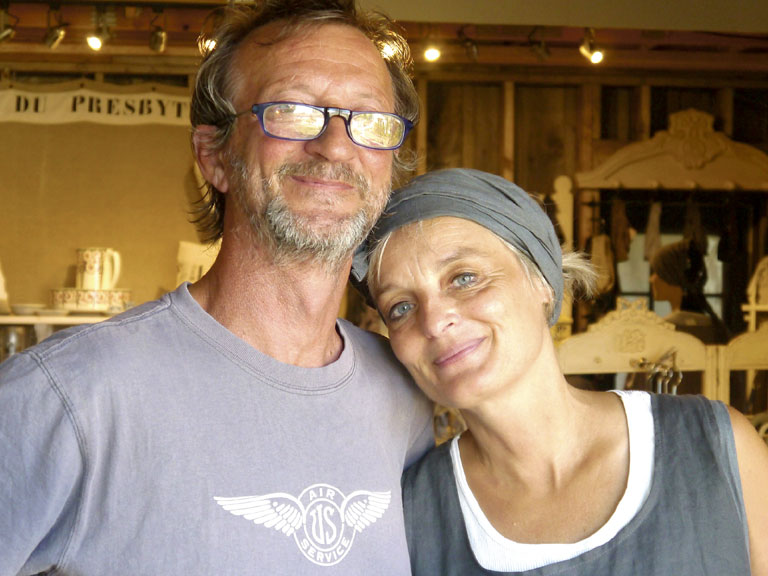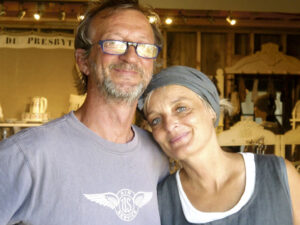County News
A touch of France

Milford textile business stays close to home
Tucked away on a back street in scenic Milford, the flapping ‘open’ flag and discreet signage are the only clues there is more here than meets the eye. Beyond the imposing 1851 home, shaded in part by a mature tree, a row of lavender plants at the front of the property provides a further clue to what lies beyond. At the end of the driveway, a new modern take on an old barn design replaces a little garage on the property. Constructed last year, it acts as a retail space which opened to the public on July 1. Once some internal finishing is complete, a working studio and storage space will move from the residence to the new purpose-built barn.
Partners in life and in business, French-born Françoise Méchin Pellet and Thierry Méchin have owned and operated L’Atelier du Presbytère since 1996. This is an international story that saw the couple emigrate from the south of France to Canada 14 years ago, first to Montreal, before landing in the quiet historic village of Milford four years ago. The move to Canada came when they were looking for a better quality of life. “We decided to find a property and to be able to put our studio on the property,” explains Françoise. The discovery of Prince Edward County came in 2009 while vacationing here as a family. “We just fell in love with the place and the ambience; it was a little bit like Provence, and now there is lavender and wine and all the food and everything. We love Milford, it is more country than city, we like to say we live downtown Milford,” laughs Françoise. “The city is not for us, we prefer Milford because it is off the beaten path, it is not too far, it is perfect,” adds Thierry.
L’Atelier du Presbytère work with only linen; it could be vintage linen or newly woven linen, but it is always linen which they import from France; antique linen is difficult to source in Canada because it is such a new country explains Thierry. Their extensive collection of wares includes clothes, fashion accessories, housewares and décor items, as well as a touch of the unexpected, such as unique door stops. As makers and designers for 24 years working with textiles, Françoise’s role is one of sewer; Thierry does the cutting, but also the washing and ironing, carefully preparing the material for Françoise’s expert hand.
Pre-COVID-19, this couple’s routine consisted of attending shows and markets across Ontario (including the Wellington Farmers’ Market for the last four years), a life Françoise describes as one with real energy, and one they miss. Work happens through the winter months where they are in full production for a minimum four months creating, designing and building inventory for the following season. “I cut, I wash, I prepare all the pieces for Françoise; I design the pattern, I chose the linen and I organize the linen because we have lots of different linen,” explains Thierry. “I iron all the linen, we wash three or four times before (to eliminate shrinkage) and you iron to have no wrinkles before you cut, you need very smooth for the perfect cut.”

Thierry Méchin and Françoise Méchin Pellet at their recently opened textile business, L’Atelier du Presbytère.
Thierry describes how they work with a mix new and old linen. “Old linen is very different,” he says. “Old linen was woven manually, now it is mechanical, but it is the same weaving.” He also notes old linen wasn’t subject to farmers’ insecticides and pesticides on the soil, so is a superior quality, something that has altered the quality of new linen. Some of the vintage linens can be 100 years old and may come from old dresses, old tablecloths with original embroidery, old tea towels and napkins, or a sheet from the First World War. “We like the mix because people see the difference,” he says. While the old linen is more resistant, stronger because of its tighter weave, it is not suited to making clothes, which work better with new linen. Vintage linen is best for bags, cushions, tea towels and so on explains Thierry, where “It gives a second life to the linen.” He goes on to explain how old linen is never the same colour because it depends on the plants. “If the weather is very dry, the plant is very clear, and when its humid and too much rain, it is very dark, it is very different,” he says, noting how new linen is always the same colour.
“When the pandemic happened, we had all our shows cancelled, it was hard like for everybody,” explains Françoise. “Now it is more complicated, so we decided to adjust, we decided to make the maximum production we could until the middle of June,” she explains. “Usually, we begin to work and have income in April, but this year nothing until middle of June, so it was a little bit hard. We were very worried when everything happened, but since we opened the first of July, we had lot of order online and some people here too,” says Françoise. “We are very happy, but we will have to see how it goes until the end of the year.”
They are following recommended safety protocols with additional cleaning, hand sanitizer and mask wearing (mandatory inside), something Françoise says made it much easier because now there is no question. “People are allowed to touch the fabric. If they want to try something on, we allow them to try one design and if the item is not purchased, it is quarantined and steam cleaned,” she says. “We try to do all the maximum to be safe, and I think it will work. We are very strict: it is only three visitors in the shop, plus us two if we are needed.” Outside, there is lots of space with two long benches widely spaced. “It’s an opportunity to have a little place to show what we do and it’s not a busy, busy place; we want to work for sure, but if we wanted to be busy busy we would have a shop in Picton or Wellington,” says Françoise. “People can see where it is made and by who, and if I need to do a little sewing I can do so. This is our project; it is handmade, but we want people to see it is handmade here, by us, and they can see me behind the sewing machine.”
Francoise says she loves the concept of staying small with just the two of them running the niche business. “When we were in France, we had a crazy life; we were doing wholesale and had eight women working for us,” she says. “Now we do a lot of things in small quantity.” Thierry talks about the need for change. “In France, we had a good company, good employees, it is perfect, but it is a routine and after 15 years, I want a change,” he explains. “When you move, you have a different idea, it is good for the creativity, you have another energy, it is very different.” Françoise says the passion for what they do comes before making an income. “It is doing what we like and living with that,” she says. “Every day is a surprise, it’s nice and we like that,” says Thierry. “We are very happy here.” L’Atelier du Presbytère (atelierdupresbytere.com) is located at 42 St. Philip Street, Milford and is open Wednesday to Sunday, 10 a.m. to 6 p.m. until Thanksgiving weekend.

Comments (0)